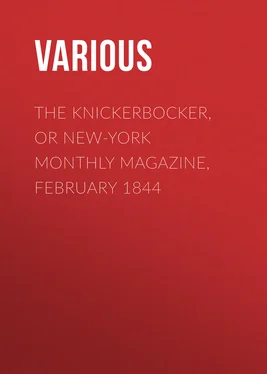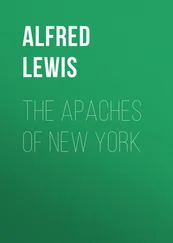Various - The Knickerbocker, or New-York Monthly Magazine, February 1844
Здесь есть возможность читать онлайн «Various - The Knickerbocker, or New-York Monthly Magazine, February 1844» — ознакомительный отрывок электронной книги совершенно бесплатно, а после прочтения отрывка купить полную версию. В некоторых случаях можно слушать аудио, скачать через торрент в формате fb2 и присутствует краткое содержание. Жанр: foreign_antique, periodic, foreign_edu, на английском языке. Описание произведения, (предисловие) а так же отзывы посетителей доступны на портале библиотеки ЛибКат.
- Название:The Knickerbocker, or New-York Monthly Magazine, February 1844
- Автор:
- Жанр:
- Год:неизвестен
- ISBN:нет данных
- Рейтинг книги:3 / 5. Голосов: 1
-
Избранное:Добавить в избранное
- Отзывы:
-
Ваша оценка:
- 60
- 1
- 2
- 3
- 4
- 5
The Knickerbocker, or New-York Monthly Magazine, February 1844: краткое содержание, описание и аннотация
Предлагаем к чтению аннотацию, описание, краткое содержание или предисловие (зависит от того, что написал сам автор книги «The Knickerbocker, or New-York Monthly Magazine, February 1844»). Если вы не нашли необходимую информацию о книге — напишите в комментариях, мы постараемся отыскать её.
The Knickerbocker, or New-York Monthly Magazine, February 1844 — читать онлайн ознакомительный отрывок
Ниже представлен текст книги, разбитый по страницам. Система сохранения места последней прочитанной страницы, позволяет с удобством читать онлайн бесплатно книгу «The Knickerbocker, or New-York Monthly Magazine, February 1844», без необходимости каждый раз заново искать на чём Вы остановились. Поставьте закладку, и сможете в любой момент перейти на страницу, на которой закончили чтение.
Интервал:
Закладка:
But a wail is borne on the troubled air:
What victim comes those frowns to dare?
’Tis woman’s form and woman’s eye,
That Time hath passed full lightly by;
The limner’s art in vain might trace
The glorious beauty and winning grace
Of that fair girl; youth’s sunny day
Flings its radiance over life’s changing way:
Why has she left her princely home,
Why to that hall a suppliant come?
Her heart is sad with a deepening gloom,
For Hope has found in her heart a tomb.
With quiv’ring lip, and eye whose light
Is faint as the moon in a cloudy night,
And with cheek as pale as the crimson glow
That the sunset casts on the spotless snow;
Nerved with the strength of wild despair,
Low at their feet she pours her prayer:
‘My home! my home! is desolate,
For ye have slain them all,
And cast upon the light of Love
Death’s cold and fearful pall.
We knelt in agony to save
My father’s silver hair,
Ye would not mark the bitter tears,
Nor list the frantic prayer!
‘And then ye took my mother too:
Ye must remember now
The words that lingered on her lip,
The grief upon her brow;
My sister wept in bitter wo—
Her dark and earnest eyes
Asked for the mercy ye will seek
In vain in yonder skies!
‘But your hearts were like the flinty rock,
And cold as ocean’s foam;
You tore them from my clasping arms,
And bore them from our home:
And now my brothers ye will slay!
But they are proud and high,
And come with spirits brave and true,
Your tortures to defy.
‘I will not ask from you their lives,
I will not seek to roll
The clouds of midnight from your hearts;
Ye cannot touch the soul!
But grant my prayer, and I will pray
For you in yonder sky;
Oh, God! I ask a little thing—
I ask with them to die!’
But the burning words fell cold and lone,
As the sun’s warm rays on a marble stone;
Life was a curse too bitter and wild
For the broken heart of Earth’s weary child;
And the stricken one found a self-sought grave
’Neath the crystal light of the foaming wave.
THE DEATH BED
A STRAY LEAF FROM THE PORT-FOLIO OF A ‘COUNTRY DOCTOR.’
‘Bury me in the valley, beneath the willows where I have watched the rippling waves, among the scenes of beauty which I loved so well, oh! my friend!’ exclaimed the dying youth; and as he grasped my hand his lips moved tremblingly, tears gushed upon his wan cheeks, and an expression of very sadness stole upon him. His looks were lingering; such as one flings back upon some paradise of beauty which he leaves forever; some home which childhood has endeared to him, and affection has filled with the loves and graces. Pity touched my soul as I regarded silently that beaming countenance, alas! so shrunken from the swelling, undulating lines of his hilarious health; a pity such as one feels whose hopes are too inexplicably bound up with another’s, who shares his very being, and who knows by all the sympathies of a brother’s bosom that the other’s heart-strings are snapping. Animæ dimidium meæ! —beautiful expression of the poet, comprehended less while life unites, than when death severs. It is only when gazing on the seal which has been set, we inquire ‘Where is the spirit?’ and struggle in vain to understand that great difference; when the smiles which shed their sunshine have rapidly vanished, and the voice we loved has died away like the music of a harp; when that which was light, joy, wit, eloquence, has departed with the latest breath; when, in short, we are awakened from our revery by the clods falling on the coffin, and the mourners moving away; it is then that the soul, diminished of its essence, flits away with a strange sense to its unjoyous abode, as a bird would return to its lonely nest.
There never existed one who more lived and moved, and had his spiritual being in the affections; a sensitive nature wooed into life by the kindness of the faintest breath, but killingly crushed by the footsteps of the thoughtless or the cruel. For such a one, life is well deserving of the epithet applied to it by the poet Virgil: dulcis vita , sweet life. It is not a vulgar sensuality, a Lethean torpor; the triumph of the grosser nature over the eternal principle within. It is already a separation of the carnal from the spiritual; a refinement of fierce passions; a present divorce from a close and clinging alliance; a foretaste of the waters of life; in short, the very essence and devotion of a pure religion. Would it seem strangely inconsistent that a being of so sweet a character as I shall describe him, my poor young friend declared, with a gush of the bitterest tears, that he could not go into the dark valley, for he loved life with an inconceivable, passionate love? His was the very agony and pathos of the dying Hoffman, when almost with his latest breath, he alluded to ‘the sweet habitude of being.’ But it was only, thanks be to God! a short defection, a momentary clouding of that bright faith which was destined soon to see beyond the vale. His tears ceased to flow, glistened a moment, and then passed away as if they had been wiped by some gentle hand.
He leaned upon a soft couch, so very pale and haggard that his hour seemed very near. Costly books strewed his table; pictures and many exquisite things were scattered about with lavish hand; for wealth administered to refined luxury, and affection crowned him with blessings which gold can never buy. A mother hid from him her bitter tears, and spoke the words of cheerfulness; sisters pressed around him with the poignant grief an only brother can inspire; a beautiful betrothed betokened to him in irrepressible tears her depth and purity of love. Letters came to him hurried on the wings of friendship, and impressed on all their seals with sentiments which awakened hope. Youth and beauty hovered around him with their unintermitted care, and Age sent up its fervent prayers to heaven. Oh! who but the ungrateful would not love a life so filled with blandishments and crowned with blessings? Who could see all these receding without a sigh, or feel the pressure of that kiss of love as pure as if it had its origin in Heaven? But with the finest organization of intellectual mind, he had been accustomed to look at all things in the light of poetry. For one so constituted the pleasures which are in store are as inexhaustible as the works or mercies of his God. Not an hour which did not present some new phase of undiscovered beauty. He revelled in the beams of the morning; the rising sun was never a common object, nor its grandeur ever lost upon a soul so conscious of the sublime. For all beauty in nature he found a correspondent passion in the soul; and intoxicated alike with the music of birds or the perfume of flowers, found no weariness in a life whose current was like the living spring, pure, perennial and delightful.
To be so susceptible of pleasure, I would be willing to encounter all the keenness of pangs suffered by such natures. For such, the rational delights of a year are crowded into a day, an hour; and the ignorant reader of their obituary sighs mournfully, computing their lives by a false reckoning. Yet after all, we have been disposed to regard the death of the young as something unnatural; the violent rending asunder of soul and body; the penalty enacted of a life artificial in its modes and repugnant to nature. As Cicero has beautifully expressed it, it is like the sudden quenching of a bright flame; but the death of the virtuous Old is as expected, as free from terror as the sunset; it is the coming of a gentle sleep after a long and weary day.
Читать дальшеИнтервал:
Закладка:
Похожие книги на «The Knickerbocker, or New-York Monthly Magazine, February 1844»
Представляем Вашему вниманию похожие книги на «The Knickerbocker, or New-York Monthly Magazine, February 1844» списком для выбора. Мы отобрали схожую по названию и смыслу литературу в надежде предоставить читателям больше вариантов отыскать новые, интересные, ещё непрочитанные произведения.
Обсуждение, отзывы о книге «The Knickerbocker, or New-York Monthly Magazine, February 1844» и просто собственные мнения читателей. Оставьте ваши комментарии, напишите, что Вы думаете о произведении, его смысле или главных героях. Укажите что конкретно понравилось, а что нет, и почему Вы так считаете.












